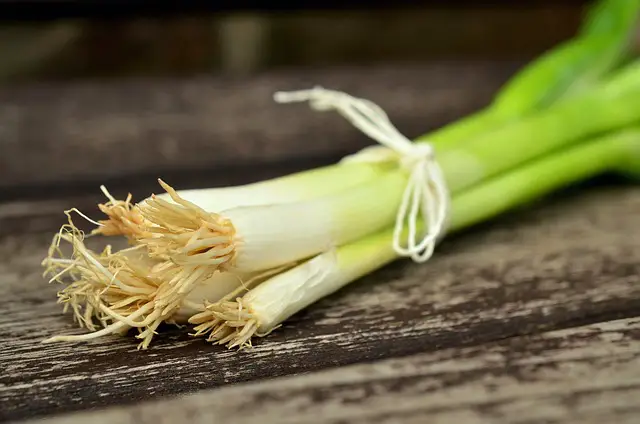Bearded dragons are popular pets that are known to have a diverse diet. However, it can be challenging for owners to determine which foods are safe for their bearded dragons. One food that owners may question is green onions.
Green onions, also known as scallions, are a type of onion that is commonly used in many different types of cuisine. While they are safe for humans to consume, some owners may wonder if they are safe for bearded dragons.
The answer is that it depends on the individual bearded dragon and how it reacts to certain foods.
While some bearded dragons may tolerate small amounts of green onions without any adverse side effects, others may experience digestive or other health problems.
As with any new food, owners need to introduce green onions slowly and in small quantities to monitor their bearded dragon’s reaction.
If any adverse side effects are observed, owners should stop feeding their bearded dragon green onions immediately and consult with a veterinarian.
Can Bearded Dragons Eat Green Onions?
Benefits of Green Onions for Bearded Dragons
Green onions, also known as scallions, are a type of onion that can be fed to bearded dragons in moderation. They are a good source of vitamins A and C, calcium, and potassium. These nutrients are essential for maintaining a healthy immune system, skin, and bones in bearded dragons.
Green onions can also provide some variety in a bearded dragon’s diet, which can help prevent boredom and encourage healthy eating habits. However, they should not be a staple food and should only be given as an occasional treat.
Risks of Feeding Green Onions to Bearded Dragons
While green onions can benefit bearded dragons, they can also pose some risks if fed in excess. Green onions contain a compound called thiosulphate, which can be toxic to bearded dragons in large amounts. This compound can cause anemia and damage to the liver and kidneys.
It is important to note that the toxic effects of thiosulphate are typically only seen in bearded dragons that have consumed large amounts of green onions over a long period. However, it is still important to exercise caution when feeding green onions to bearded dragons and to only offer them in small amounts as an occasional treat.
Other Vegetables That Bearded Dragons Can Eat
Bearded dragons are omnivores and can eat various vegetables besides their main diet of insects. Here are some other vegetables that bearded dragons can eat:
- Carrots
- Squash
- Zucchini
- Peppers
- Collard greens
- Mustard greens
- Kale
- Endive
- Turnip greens
- Watercress
It’s important to note that while bearded dragons can eat various vegetables, not all vegetables are safe to consume. For example, vegetables high in oxalates, such as spinach and beet greens, should be fed in moderation or avoided altogether. Additionally, vegetables high in goitrogens, such as broccoli and cauliflower, should be fed in moderation.
When feeding vegetables to your bearded dragon, washing them thoroughly and cutting them into small, bite-sized pieces is essential. You can offer vegetables to your bearded dragon, raw or cooked, but avoid adding seasonings or oils.
Nutritional Requirements of Bearded Dragons
Bearded dragons are omnivorous, meaning they eat both plants and animals. In the wild, they eat various insects, fruits, and vegetables. In captivity, providing them with a balanced diet is essential to ensure they receive all the nutrients they need to thrive.
Protein
Protein is an essential nutrient for bearded dragons. It helps with growth, repair of tissues, and the production of hormones and enzymes. Insects such as crickets, mealworms, and dubia roaches are good protein sources for bearded dragons. They can also eat small amounts of cooked chicken, turkey, and beef. However, it is important to avoid feeding them too much protein as it can lead to health problems such as gout.
Vitamins
Vitamins are essential for the overall health of bearded dragons. They need vitamin A for vision, skin, and immune function. Vitamin D3 helps with calcium absorption, which is essential for bone health. Vitamin E is an antioxidant that helps protect cells from damage.
Bearded dragons can get these vitamins from fruits and vegetables such as kale, collard greens, carrots, and sweet potatoes. Providing a variety of these foods is essential to ensure they receive all the vitamins they need.
Minerals
Minerals are essential for many functions in the body, such as bone health, muscle function, and nerve function. Calcium and phosphorus are two minerals that are particularly important for bearded dragons. They need a calcium-to-phosphorus ratio of 2:1.
This can be achieved by feeding them various calcium-rich foods such as collard greens, kale, and calcium supplements. But on the other hand, too much phosphorus can lead to health problems such as metabolic bone disease.
Conclusion
After reviewing the available information, feeding green onions to bearded dragons is not recommended. Although they are not toxic, they contain compounds that can harm these reptiles. While small amounts may not cause immediate harm, regular or significant amounts can lead to digestive and other health problems.
It is important to note that bearded dragons have specific dietary requirements that should be met for optimal health.
A varied diet of vegetables, fruits, and insects is recommended, with the appropriate balance of nutrients and calcium. Feeding them a diet high in one particular food item, such as green onions, can lead to imbalances and deficiencies.
If you are unsure what foods are safe for your bearded dragon, it is always best to consult a veterinarian or a reptile expert. They can provide you with the necessary guidance and information to ensure your pet gets the nutrition it needs without risking its health.




